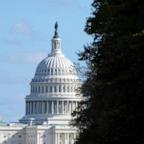On Tuesday, voters in Arizona, Colorado, Maryland, Missouri, Montana, New York and Nevada passed measures that would enshrine abortion rights in their state constitutions, making abortion a winning issue in 7 of the 10 states where it was on the ballot. But voters in Missouri, Montana and Nevada also voted to send Trump, who appointed the judges who overturned Roe v. Wade, back to the White House. The presidential race has yet to be projected in Arizona, but Trump leads there, too.
An April survey by nonpartisan research firm PerryUndem found that 35% of Trump voters would at least lean toward voting for a constitutional amendment that protected the right to abortion in their state. That was especially true of Trump voters who were women, younger, described themselves as liberal or moderate, or were voters of color.
A poll from September from The New York Times/Siena College also suggested that many of these voters also don't think Trump would try to restrict abortion nationwide if elected: 49% of all likely voters and just 27% of Republicans in that poll thought he would. So many voters may simply feel that voting to protect abortion in their state is sufficient, and that Trump will not make good on Republican calls for a national ban.
“The bottom line in my view is … Abortion rights and access is more popular than Trump. It’s more popular than Harris. It’s more popular than the Democratic Party or the Republican Party,” said Tresa Undem, a cofounder of PerryUndem. “But, among Trump voters, it wasn’t the driving issue for voting for Trump.”
Some Republicans have waffled on whether they would try to ban abortion nationally. A 538 analysis of this year's GOP primaries found that in swing states and toss-up districts, Republican candidates were much less likely to mention abortion and more likely to say the issue was best left up to the states, while candidates in red states and solid Republican districts were very likely to support a national ban. The GOP left the endorsement of a national ban on abortion off their platform this year for the first time in nearly 40 years, and House Republicans in the current Congress did not pursue one either (though it was a moot issue since it wouldn't have passed in a Democratic Senate). But Trump has flip-flopped on a national abortion ban in the past, even as it remains a key goal of anti-abortion advocates nationwide. Such a ban by a newly elected Republican Senate, House and president (assuming House Republicans remain on track to hold their majority) could render the state-level initiatives that have passed since Roe was overturned useless — though it's far from certain that they would pursue or be able to pass such an unpopular policy.







